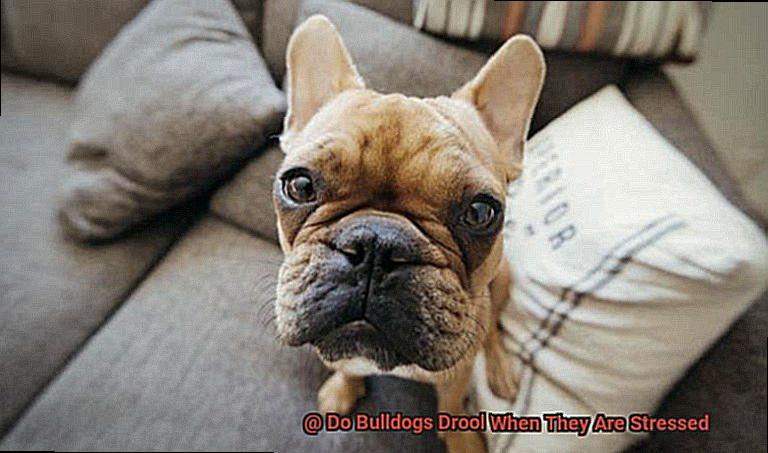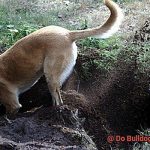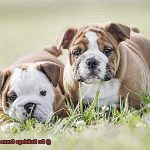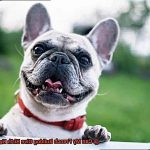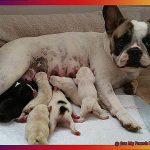Do Bulldogs Drool When They Are Stressed?
Get ready to dive into the wild world of Bulldogs and their drool-filled escapades when stress comes knocking. If you’ve ever wondered why these wrinkly cuties turn into slobber machines under pressure, or how to spot and soothe their stress, you’re in for a treat.
Imagine this: your beloved Bulldog, usually a picture of charm and resilience, suddenly starts leaking drool like a leaky faucet. Is it a distress signal? You betcha. Bulldogs have this quirky stress response that cranks up their saliva production, turning them into adorable mess-makers. But what triggers this drooling extravaganza?
Bulldogs, with their unique looks and lovable personalities, are sensitive souls. When faced with anxiety-inducing situations, their stress-o-meter goes haywire, causing an overdrive in the saliva department. Blame it on cortisol, the stress hormone that revs up their salivary glands and turns on the tap.
Spotting stress in Bulldogs isn’t always a walk in the park since they express it differently. It could be subtle hints or full-blown drool galore. So keep an eye out for signs like excessive panting, pacing like they’re in a marathon, whining non-stop, refusing food (gasp.), or even attempting great escapes from stressful scenarios. These clues can help you gauge if your Bulldog is feeling more stressed than comfy.
Thankfully, we can do plenty to ease our Bulldogs’ worries and minimize those drool-worthy moments. First things first – create a zen zone for your furry friend. Give them a quiet retreat where they can unwind when life gets too much to handle. Plus, regular exercise and mental stimulation work wonders in keeping those stress levels at bay. And hey, sticking to a consistent routine is like doggy therapy.
While we can tackle stress on our own, sometimes it’s best to bring in the pros. Consulting a trusted vet or canine behaviorist can provide priceless insights and personalized strategies to manage and alleviate stress effectively.
To wrap it up, Bulldogs may be prone to turning into slobbery messes when stress hits, but armed with knowledge about their behavior and proactive approaches, we can create a calmer and drool-free environment for our furry pals. So let’s get ready to conquer Bulldog stress together.
Understanding the Physiology of Drooling in Bulldogs
Contents
- 1 Understanding the Physiology of Drooling in Bulldogs
- 2 Do Bulldogs Drool More When They Are Stressed?
- 3 The Role of Salivary Production in Stress-Induced Drooling
- 4 Panting as a Potential Trigger for Increased Drooling in Bulldogs
- 5 Not All Bulldogs Will Drool When They Are Stressed
- 6 Identifying Patterns in Your Bulldog’s Drooling Behavior
- 7 Managing Stress to Reduce Excessive Drooling in Bulldogs
- 8 Medical Conditions That Can Cause Excessive Drooling in Bulldogs
- 9 Conclusion
Do French Bulldogs drool when they are stressed? This is a question that many owners of this lovable breed often ask. Bulldogs are known for their excessive drooling, which can sometimes be a cause for concern. To understand why Bulldogs drool when they are stressed, it is important to delve into the physiology behind drooling in general.
Drooling, scientifically known as hypersalivation or ptyalism, is a natural process that occurs in all dogs and serves various purposes. Saliva plays a crucial role in lubricating the mouth, aiding in the digestion process, and maintaining oral hygiene. However, Bulldogs have an anatomical predisposition to drool due to their unique facial structure.
Bulldogs have loose skin around the mouth and prominent jowls, which contribute to increased production and accumulation of saliva. This makes Bulldogs more prone to drooling compared to other breeds. So, when a Bulldog is stressed, physiological changes occur within its body.
When stress occurs, the autonomic nervous system is activated, regulating various bodily functions. The sympathetic nervous system, responsible for the body’s fight-or-flight response, is activated during stress. This leads to an increase in heart rate and blood pressure. In response to stress, the brain signals the salivary glands to produce more saliva as part of the body’s defensive mechanism.
This excessive production of saliva in times of stress is not exclusive to Bulldogs but can occur in all dog breeds. However, Bulldogs’ predisposition to drooling makes it more noticeable when they are stressed compared to other breeds.
It is important to note that not all Bulldogs exhibit excessive drooling when stressed. Individual variations can exist based on genetic factors, temperament, and overall health. Additionally, certain stressors may elicit more significant drooling responses in Bulldogs compared to others. Separation anxiety, loud noises, unfamiliar environments, or veterinary visits can trigger more intense drooling episodes in some Bulldogs.
Understanding the physiological basis of drooling in Bulldogs when they are stressed can help owners develop strategies to manage and alleviate their dogs’ discomfort. Providing a calm and safe environment, implementing positive reinforcement training techniques, and gradually exposing Bulldogs to stressors can help reduce their drooling response.
Furthermore, regular veterinary check-ups and monitoring the overall health of Bulldogs can ensure that excessive drooling is not indicative of an underlying medical condition.
Do Bulldogs Drool More When They Are Stressed?
In this blog post, I’ll dive into the fascinating world of Bulldogs and stress-induced drooling. So, grab a cup of coffee, get cozy, and let’s explore this drool dilemma together.
Why Do Bulldogs Drool More When They Are Stressed?
- Facial Structure: Bulldogs are known for their adorable, wrinkled muzzles and loose skin around the mouth. These unique features contribute to their excessive drooling under normal circumstances. When they’re stressed, these already prominent jowls may produce even more drool than usual.
- Emotional Arousal: Just like humans, dogs also experience stress in various situations. Stress can trigger emotional arousal in Bulldogs, leading to an increase in salivation as a natural response. So, when your Bulldog is feeling anxious or fearful, you may notice them drooling more.
- Digestive System Changes: Stress can impact the digestive system in dogs, potentially leading to increased saliva production. While the exact mechanisms behind this phenomenon are not fully understood, it’s believed that stress can stimulate the production of saliva, resulting in more drooling.
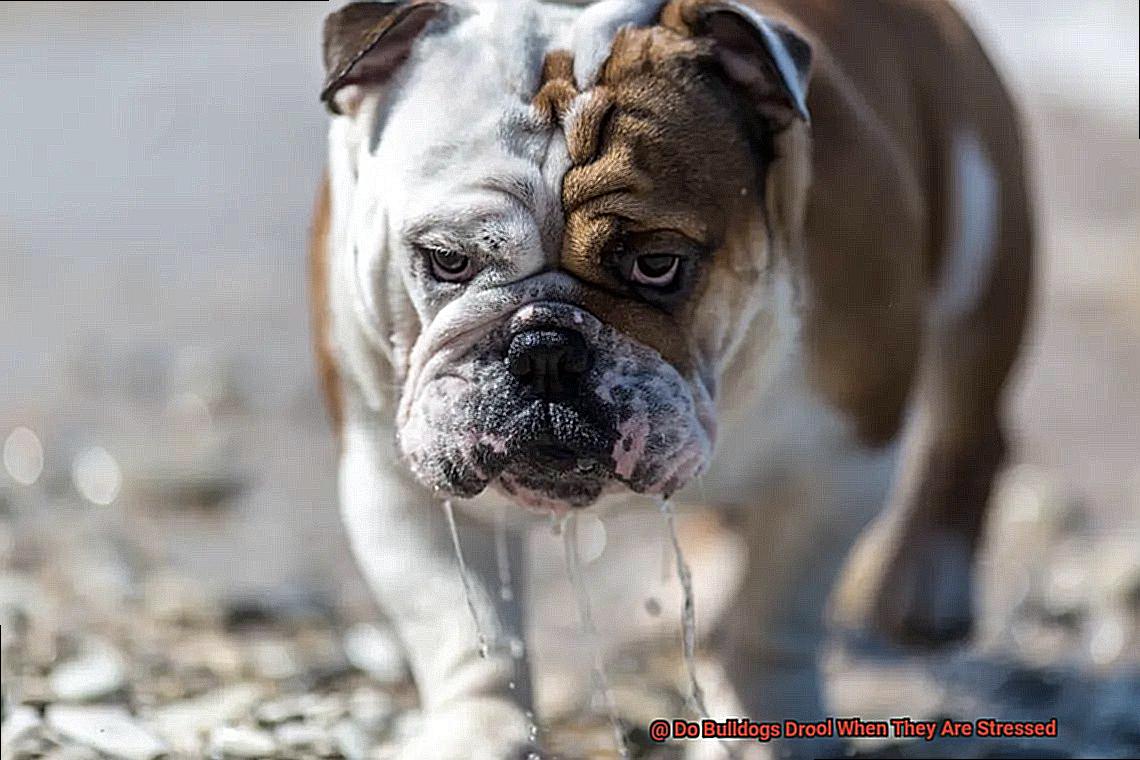
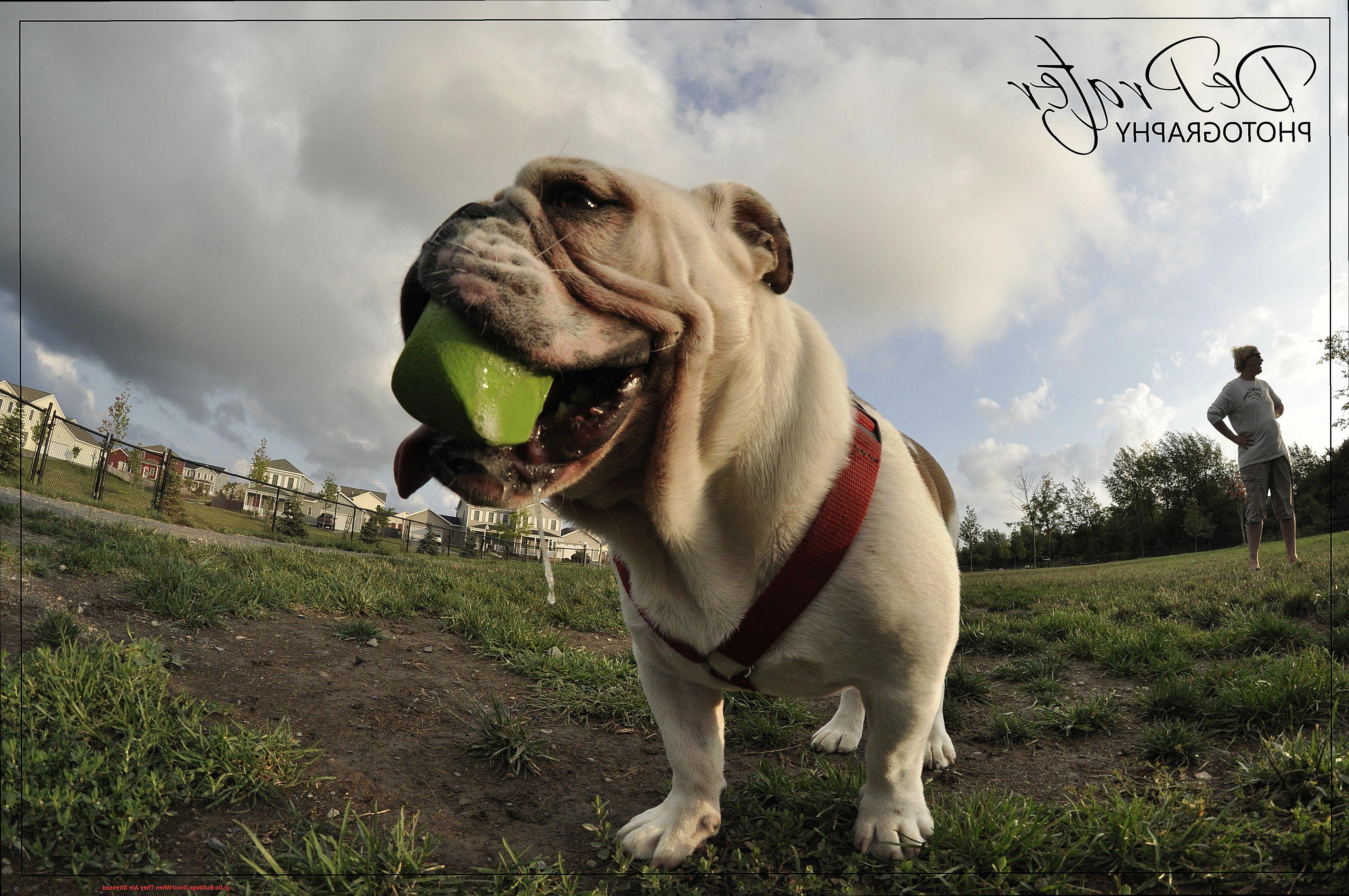
Managing Bulldogs’ Stress Levels and Minimizing Excessive Drooling:
- Create a Calm Environment: Bulldogs thrive in a peaceful environment, so make sure their surroundings are stress-free. Provide a comfortable crate or designated space where they can retreat when feeling overwhelmed. Playing soothing music or using calming pheromone sprays may also help create a relaxing atmosphere.
- Avoid Triggers: Identify and avoid situations that cause stress for your Bulldog whenever possible. This could include loud noises, separation anxiety triggers, or introducing them to unfamiliar environments without proper acclimation.
- Positive Reinforcement Training: Implement positive reinforcement techniques to help your Bulldog associate stressful situations with positive experiences. Reward them with treats, praise, or playtime when they remain calm and relaxed in potentially stressful scenarios.
The Role of Salivary Production in Stress-Induced Drooling
Grab a cup of coffee, sit back, and let’s dive into the world of bulldogs and their slobbery reactions to stress.
Understanding the Role of Salivary Production:
Salivary production is an essential physiological process that aids in digestion and oral health. However, it can also be influenced by external factors, including stress. When a bulldog experiences stress, it can trigger an increase in salivary production, leading to excessive drooling.
The Mechanism Behind Stress-Induced Drooling:
The stress response in dogs activates the autonomic nervous system, which controls involuntary bodily functions such as salivary production. This activation stimulates an increase in saliva production, resulting in those adorable (yet sometimes messy) drool puddles on your floor.
Research suggests that stress hormones like cortisol may play a role in stimulating salivary glands. Additionally, stressed dogs may produce saliva with higher viscosity and different chemical composition compared to non-stressed dogs.
Managing Stress to Minimize Drooling Episodes:
While not all bulldogs will drool excessively when stressed, managing stress levels can help reduce these episodes. Here are some effective strategies:
- Create a Calm Environment: Establish a peaceful and stable environment for your bulldog. Avoid loud noises, sudden changes, or chaotic situations that may trigger stress.
- Regular Exercise: Engage your furry friend in daily exercise to release pent-up energy and promote relaxation.
- Mental Stimulation: Provide interactive toys or puzzles to keep your bulldog mentally engaged and distracted from potential stressors.
- Positive Reinforcement Training: Use reward-based training techniques to build confidence and reinforce positive behaviors, helping your bulldog cope better with stress.
- Seek Professional Guidance: If your bulldog’s excessive drooling persists, consult with a veterinarian or professional dog behaviorist for tailored solutions and behavior modification techniques.
Understanding the role of salivary production in stress-induced drooling is crucial for bulldog owners. By implementing stress management techniques and seeking professional guidance when needed, you can ensure the well-being of your four-legged companion. So embrace those adorable drool-filled moments while keeping your bulldog happy and stress-free.
Panting as a Potential Trigger for Increased Drooling in Bulldogs
Bulldogs – those lovable, wrinkly-faced pups that steal our hearts with their charming personalities. But let’s be honest, their drooling tendencies can sometimes be a bit overwhelming. Have you ever wondered why Bulldogs drool more when they pant? Well, buckle up because we’re about to explore the potential relationship between panting and increased drooling in Bulldogs.
Panting: More than Just a Cooling Mechanism
Panting is a natural behavior in dogs, including Bulldogs. It’s their way of regulating body temperature and cooling down on hot days or after a strenuous play session at the park. However, panting can also be an indicator of stress or anxiety in dogs.
Stress Hormones and Saliva Production
When Bulldogs are stressed, their bodies release stress hormones that can cause an increase in saliva production. This excess saliva leads to drooling. Panting, often associated with stress, can intensify this drooling tendency.
Stimulating the Salivary Glands
One possible explanation for the relationship between panting and increased drooling is that the act of panting stimulates the salivary glands, causing them to produce more saliva. This stimulation may be due to the increased airflow and movement in the mouth during panting.
Dehydration and Excessive Drooling
Panting can also lead to dehydration in Bulldogs, which can further contribute to excessive drooling. When dogs pant excessively, they lose moisture through evaporation, resulting in a decrease in overall body fluid levels. This dehydration can stimulate the salivary glands to produce more saliva as a compensatory mechanism.
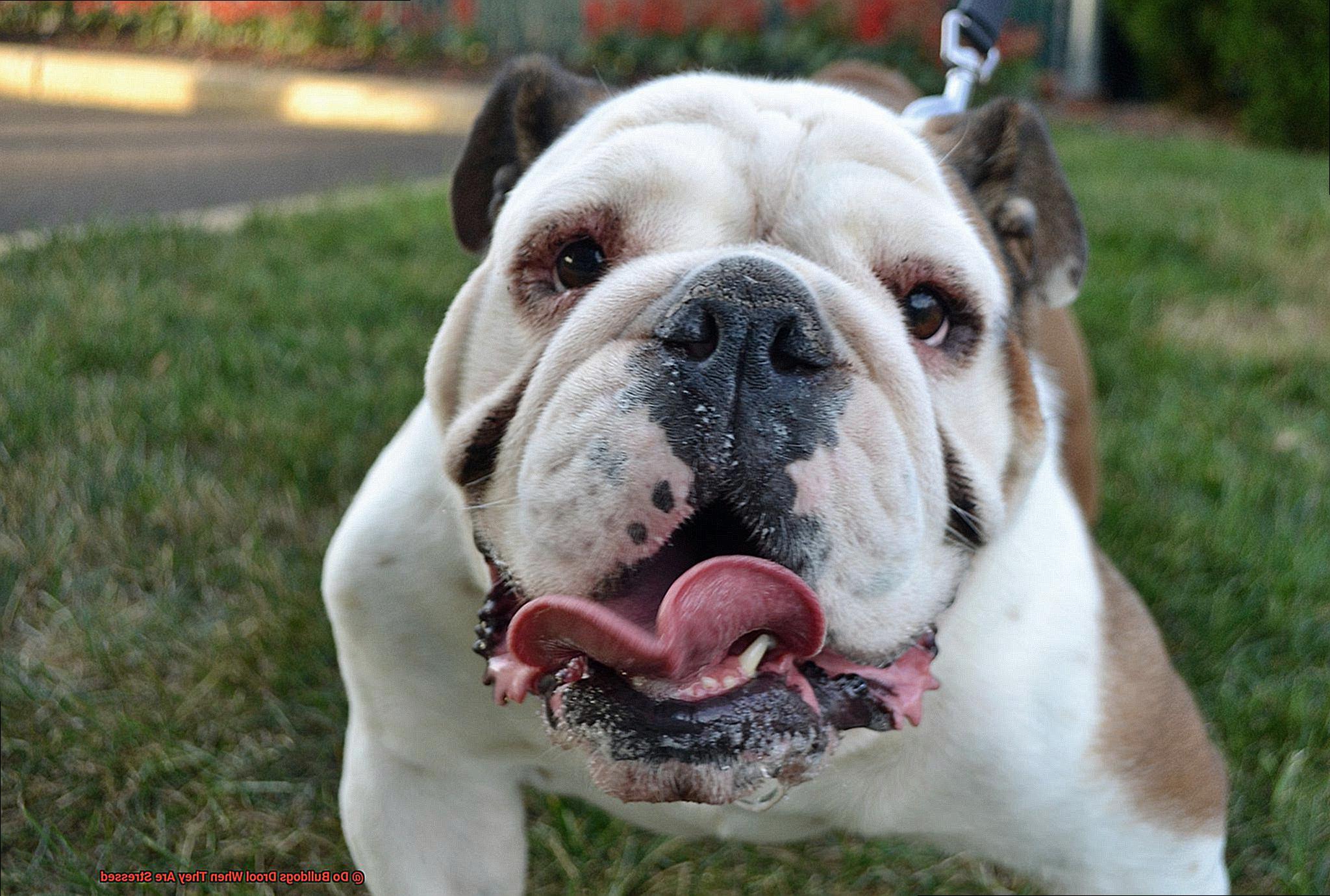
Individual Responses to Stress
It’s important to note that not all Bulldogs will drool when they are stressed. Just like humans, dogs have unique individual responses to stressors. Some Bulldogs may experience increased drooling as a result of stress, while others may not exhibit this behavior at all.
Not All Bulldogs Will Drool When They Are Stressed
As a proud owner of a French Bulldog, you may have noticed that your furry friend doesn’t drool when they are stressed. You might be wondering why this is the case and if it’s something to be concerned about. Well, fear not. Not all Bulldogs will drool when they are stressed, and in this article, we’ll explore why.
Genetics and Individual Temperament
Just like humans, dogs have their own unique personalities and ways of dealing with stress. While some Bulldogs may drool excessively when they are stressed, others may not show any signs of drooling at all. This can be attributed to various factors, including genetics and individual temperament.
Previous Experiences
Another reason why not all Bulldogs will drool when they are stressed is their previous experiences. If your Bulldog has had positive experiences and has been properly socialized from a young age, they may be less likely to drool when they are stressed. On the other hand, if your Bulldog has had negative experiences or has not been properly socialized, they may be more prone to drooling as a stress response.
Alternative Stress Responses
Just because your Bulldog doesn’t drool when they are stressed, it doesn’t mean that they aren’t experiencing stress. Bulldogs, like any other dog breed, can exhibit alternative stress responses. These may include destructive behaviors, withdrawal or aggression, or even gastrointestinal issues like diarrhea or vomiting. It’s important to keep an eye out for these alternative signs of stress in your Bulldog.
Understanding Your Bulldog’s Individual Signals
To best support your Bulldog in times of stress, it’s essential to familiarize yourself with their individual stress signals and triggers. By understanding how your Bulldog responds to different situations, you can provide them with the care and attention they need to cope with stress effectively.
Seeking Professional Guidance
If you’re concerned about your Bulldog’s stress levels or need further guidance, don’t hesitate to consult with a veterinarian or a professional dog behaviorist. They can provide you with expert advice on managing stress in Bulldogs and address any specific concerns or challenges that may arise.
Identifying Patterns in Your Bulldog’s Drooling Behavior
Is there a method to this adorable madness? Fear not, fellow Bulldog enthusiasts. In this expert-level guide, we will delve into the world of Bulldog drooling behavior, uncovering the patterns and triggers that may be behind your pup’s slobbery antics.
Step 1: Grab Your Journal and Get Ready to Slobber
To embark on this journey of discovery, equip yourself with a trusty journal or record-keeping system. Start noting down when your Bulldog drools and the circumstances surrounding these drooling episodes. Remember, every drool has a story to tell.
Step 2: Unmasking the Triggers
Now that you have your journal ready, it’s time to play detective. Look for common triggers or patterns that may be causing your Bulldog to turn on the waterworks. Some possible triggers could include:
Separation Anxiety:
Does your Bulldog start drooling excessively when you leave them alone for long periods? Separation anxiety can trigger stress-induced drooling in these sensitive souls.
New Experiences:
Does your Bulldog turn into a drool machine when encountering new or unfamiliar environments, people, or animals? The excitement or nervousness of exploring uncharted territory can bring on the drool fest.
Stressful Events:
Keep an eye out for excessive drooling during high-stress events like vet visits, car rides, fireworks, thunderstorms, or even family gatherings. These situations can make even the most stoic Bulldogs unleash a waterfall of drool.
Step 3: Distinguish Between Normal Drooling and Stress-Induced Drooling
It’s crucial to differentiate between normal drooling and excessive drooling caused by stress. Normal drooling is often seen when a Bulldog anticipates food or water, resembling a kid waiting for ice cream. On the other hand, excessive drooling due to stress may occur even without any apparent reason. Observe your Bulldog’s body language during these drooling episodes. Signs of stress can include panting, pacing, trembling, hiding, or attempting to escape from the situation.
Step 4: Seeking Professional Guidance
If you notice a consistent pattern of excessive drooling during specific situations or events, it’s always wise to consult with a veterinarian. They can help determine if there are underlying health issues contributing to the behavior or provide guidance on managing your Bulldog’s stress levels.
Managing Stress to Reduce Excessive Drooling in Bulldogs
Luckily, managing stress in bulldogs can significantly reduce the slobber factor. In this guide, we’ll explore the various strategies to help you create a stress-free environment for your furry friend and minimize excessive drooling.
Identifying Stress Triggers:
To tackle stress-induced drooling, understanding what triggers your bulldog’s anxiety is crucial. Keep an eye out for signs of distress when exposed to loud noises, unfamiliar environments, or separation from their favorite humans. By pinpointing these triggers, you can take proactive measures to alleviate stress and reduce excessive drooling.
Creating a Zen Den:
Just like humans, bulldogs crave a calm and secure space where they can unwind. Designate a cozy corner or invest in a crate to provide a safe haven for your bulldog during stressful times. This designated relaxation area will help them feel secure and reduce anxiety levels, ultimately reducing the amount of drool on your floors.
Exercise Is Key:
Regular exercise is a powerful stress-buster for any dog breed, including French Bulldogs. Engaging your pup in daily physical activities, such as brisk walks or interactive play sessions, releases endorphins and helps burn off excess energy. Not only will this reduce stress levels but it will also contribute to better overall health and well-being.
Socialization Therapy:
Bulldogs thrive on social interactions and positive experiences with other dogs and humans. Gradually expose them to various social situations and new faces to build their confidence and ease their anxieties. This exposure therapy will work wonders in reducing stress-related behaviors, including excessive drooling caused by social anxiety.
Positive Reinforcement Training:
Training sessions that focus on positive reinforcement can be transformative for stressed-out bulldogs. Use treats, praise, and play to reward good behavior, teaching your furry friend to associate training with positive experiences. This not only boosts their self-assurance but also provides a healthy outlet for stress reduction, ultimately reducing drooling episodes.
Natural Remedies:
Sometimes, nature has the answers. Explore natural remedies such as calming pheromone diffusers or herbal supplements like chamomile or lavender to help soothe your bulldog’s nervous system. Consult with your veterinarian to ensure these remedies are safe and suitable for your pup’s individual needs.
Medical Conditions That Can Cause Excessive Drooling in Bulldogs
French Bulldogs are beloved for their adorable wrinkled faces and lovable personalities. However, one common characteristic of Bulldogs is their tendency to drool. While some drooling is normal for this breed, excessive drooling can be a sign of an underlying medical condition. In this article, we will explore the various medical conditions that can cause excessive drooling in Bulldogs, helping you identify potential health issues and seek appropriate veterinary care.
Dental Problems:
Bulldogs are prone to dental issues such as gum disease, tooth decay, and misaligned teeth. These conditions can cause pain and discomfort, leading to excessive drooling. Regular dental care, including teeth brushing and professional cleanings, can help prevent these issues.
Oral Infections:
Bacterial, viral, or fungal infections in the mouth can result in inflammation and discomfort for Bulldogs, leading to increased drooling. Regular dental check-ups and good oral hygiene practices can help prevent oral infections.
Respiratory Problems:
Brachycephalic airway syndrome is common in Bulldogs due to their flat faces and narrow nostrils. This condition can make it difficult for them to breathe properly, resulting in increased effort and excessive drooling. It is important to keep Bulldogs cool and provide them with a well-ventilated environment.
Gastrointestinal Issues:
Conditions such as acid reflux, gastritis, and gastrointestinal obstructions can cause discomfort and nausea in Bulldogs, leading to increased salivation and drooling. Maintaining a healthy diet, avoiding table scraps, and addressing any digestive issues promptly can help alleviate these symptoms.
Medication Side Effects:
Certain medications may stimulate saliva production or affect the dog’s ability to swallow properly, resulting in increased drooling. If your Bulldog starts drooling excessively after starting a new medication, consult your veterinarian for possible alternatives.
Conclusion
In conclusion, it is evident that Bulldogs do indeed drool when they are stressed.
This natural response to anxiety or tension can be quite noticeable and may vary in intensity depending on the individual dog. It is important for Bulldog owners to understand this behavior and provide appropriate support and care during times of stress.
By recognizing the signs of stress and implementing strategies to alleviate it, such as creating a calm environment or engaging in calming activities, owners can help their Bulldogs feel more comfortable and reduce excessive drooling.
